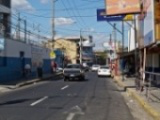El Salvador: Priest speaks of need to address 'human dimension' of those affected by gang violence

street in Mejicanos
As the truce between two gangs reaches its first anniversary, a priest has called for the need to address the human dimension of those affected by gang violence. The truce between the Mara Salvatrucha and MS-13, which was mediated by Bishop Fabio Colindres and former guerrilla Raul Mijango in March 2012, has cut El Salvador’s murder rate from 14 to five a day.
"The truce has not touched the human dimension of the person - in one year there has not been a single programme that has taken a comprehensive approach to the individuals affected by this phenomenon of gangs," said Father Antonio Rodriguez, parish priest of St Francis of Assisi Church in Mejicanos, a gang-affected area on the outskirts of San Salvador.
"The truce is a political strategy," Father Antonio told ContraPunto magazine,"but what interests me is the human dimension - and the truce has not touched on this."
"For me there are three points. The first is to take a human approach to the process, through a psycho-spiritual and psycho-social programme. A young person takes about a year to recover all the humanity affected by violence - as a perpetrator as well as a victim. Then there is a whole process of learning and training, and after about a year and a half a young man could be ready to be reintegrated into society as a new person."
"Secondly, it is important to recover the social capital or the territory that have been damaged or compromised, through processes of restorative dialogue or pacts of citizenship. This has to involve family, young people and even police or government actors who have used violence in their operations.”
"The important third level is to guarantee of human rights. I believe more rights means less violence. We must respect due process even when we arrest, prosecute and punish criminals. What we cannot do is detain offenders whilst violating their rights."















